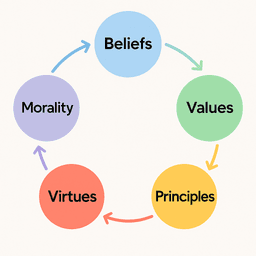
Ethics, Morality, Principles, Values, Virtues & Beliefs: What’s the Difference?
Imagine stepping into the command center of your own life. The walls are lined with maps of possible futures, screens flicker with decisions waiting to be made, and in front of you sits a glowing console covered with buttons labeled “Loyalty,” “Freedom,” “Justice,” “Family,” “Honesty.” Each one can steer your life in a completely different direction.
But who decides which button you press, and when? Are your choices guided by principles? Morality? Beliefs? Or some ancient ethical rulebook hovering above your head like a modern set of stone tablets?
Terms like values, virtues, morals, ethics, principles, and beliefs often stroll through everyday conversations as if they mean the same thing. Yet when it comes to real choices Do I stay or walk away? Do I speak up or stay silent? Do I fight for something or let it go? the differences between these concepts suddenly matter a lot.
This article is your guided tour through the hidden architecture behind how we think, act, and become who we are. Not to win a philosophical debate after Sunday brunch, but to understand yourself better. Because when you know where your decisions come from, you can shape them consciously instead of relying on auto-pilot scripts installed by family expectations, school rules, or cultural defaults.
We’ll explore:
- Beliefs that filter how you see the world
- Values that define what truly matters to you
- Principles that show you how to act
- Virtues that reflect who you are becoming
- Morality that judges what’s good or bad
- Ethics that help us live together
And by the end, you’ll walk away with a practical map of your inner world. One you can use not just to understand your choices, but to transform them.
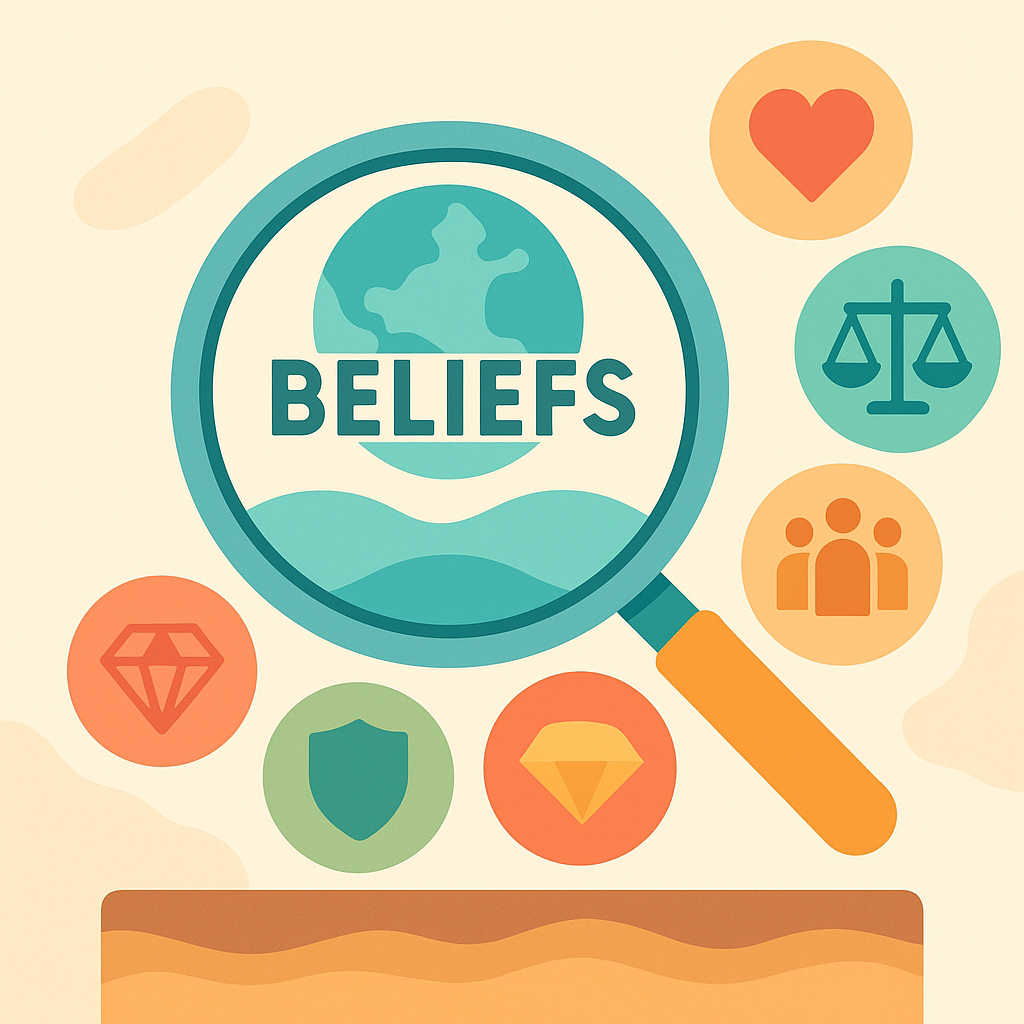
1. Beliefs: The Lens Through Which You See Everything
Beliefs are the stories we hold as true about ourselves, other people, and the world. They aren’t always examined carefully. Most of them sneak into our minds early in life: absorbed from our family’s habits, culture’s expectations, school lessons, the media we consume, even the casual remarks of strangers that stick for some mysterious reason.
Some beliefs feel warm and empowering: • “People are generally good.” • “I can handle whatever comes my way.”
Others act like invisible fences, limiting where we allow ourselves to go: • “I’m not creative.” • “Money always corrupts people.” • “If I fail once, I shouldn’t try again.”
Beliefs are filters. They tint the way we interpret every situation. Two people can look at the same event and walk away with two different meanings, because the belief-lens through which they look is entirely different.
Picture beliefs as the foundation of a house. You don’t always see them, but everything else in your inner world rests on top of them. If the foundation shifts, the structure above must shift too.
How Beliefs Shape Our Values
Beliefs often become the seeds from which values grow.
- “The world is dangerous” can sprout a value of security.
- “Everyone deserves a fair chance” can give rise to justice or equality.
- “Success requires sacrifice” may fuel ambition or discipline.
Before something becomes a value worth protecting, it usually starts as a belief about what is true.
Why It Matters
If beliefs go unquestioned, they quietly run your life like backstage operators, pulling the ropes and deciding which scenes get the spotlight.
Small Exercise
Reflect for a moment:
- Which beliefs help you expand?
- Which ones hold you back?
Write down three beliefs you strongly hold:
- One about yourself
- One about other people
- One about the world in general
Then ask:
- Where did this belief come from?
- Is it helping me become the person I want to be?

2. Values: What Truly Matters to You
Values are the inner priorities that tell you what deserves your time, energy, and protection. They are not about what you think should matter… but what actually moves you. They represent the “why” behind your actions.
A value says: “This is important in my life.”
Examples:
- Freedom
- Family
- Creativity
- Achievement
- Compassion
- Integrity
Values sit closer to the heart than beliefs. They are chosen and felt, not merely inherited. And while beliefs describe the world, values define what you want your place in that world to be.
Where Values Come From
Every value begins its life inside a belief.
- If you believe “people deserve kindness” you might value compassion.
- If you believe “life is short” you might value adventure or connection.
- If you believe “hard work pays off” you might value discipline or success.
Belief shapes the soil, value is the flower that grows from it.
Values in Action
Values affect:
- what you praise
- what you criticize
- what decisions feel “right” or “wrong”
- what you regret
- what energizes you
- what drains you
- what you’re willing to sacrifice
And they are not static. They evolve as you do. The values of a 20-year-old explorer may look very different at 40 when family or stability becomes central.
The Problem: Many People Don’t Know Their Values
Most individuals can name a few values… but they can’t rank them. That is where tension begins.
Is freedom more important than security? Is loyalty stronger than truth? Is success worth more than balance?
We face these conflicts constantly, and without clarity, we end up stuck in uncertainty or guilt.
That’s one reason why identifying and ordering your values can be transformative. It reveals your personal decision-making hierarchy.
A Quick Reflection Exercise
Ask yourself:
- What are the top three things that make life meaningful to me?
- How do I know? What choices prove it?
If your actions don’t match your declared values, you may have inherited someone else’s script. And you deserve to write your own.
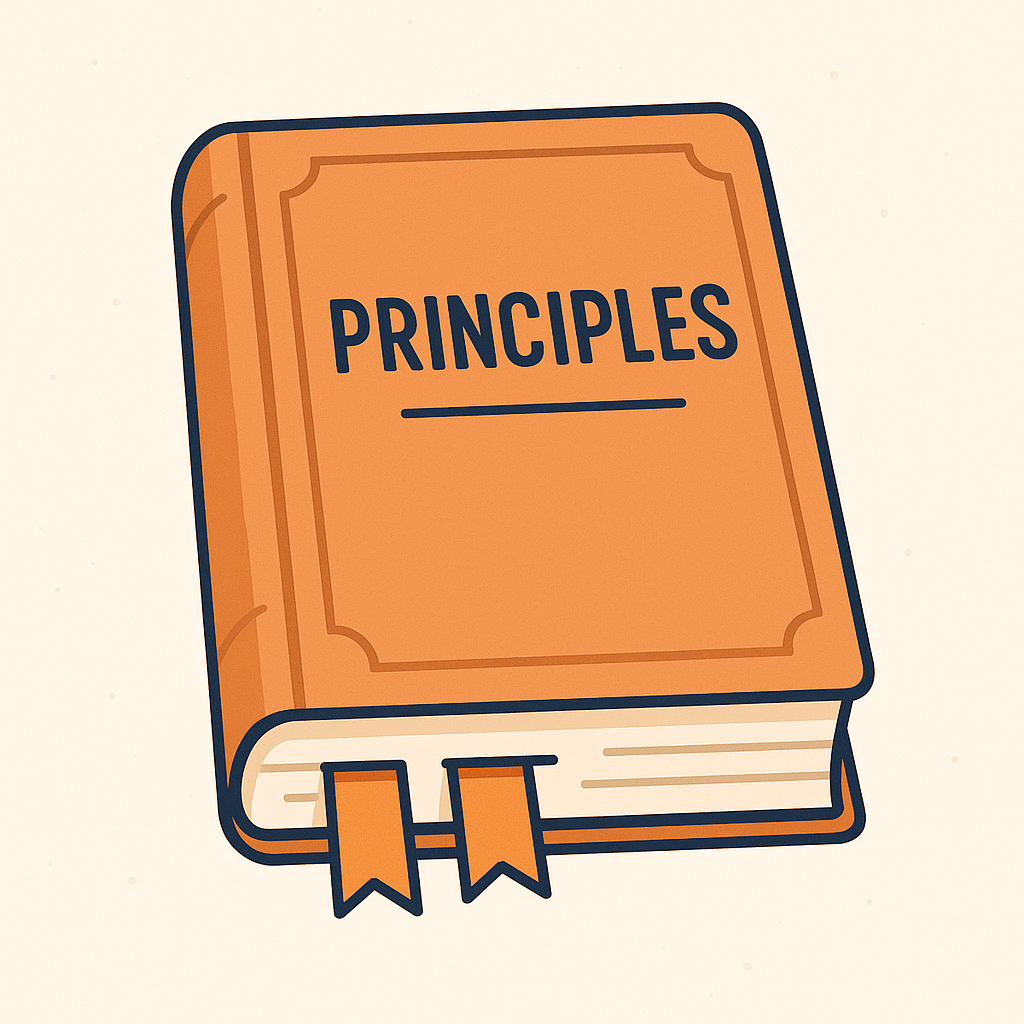
3. Principles: The Rules You Choose to Live By
If beliefs are the foundation and values are the compass, then principles are the operating system. They convert what you care about into rules for action. They tell your values: “Great intentions, but here’s what that looks like in the real world.”
A principle is a clear statement of “how I behave, no matter what.” It is your personal line in the sand.
Examples:
- “I tell the truth even when it costs me.”
- “I treat people with respect, whether or not I agree with them.”
- “I finish what I start.”
Principles are more concrete than values.
| Value | Principle |
|---|---|
| Honesty | I do not lie |
| Health | I move my body every day, even for 10 minutes |
| Freedom | I choose, I am not coerced |
Values say what matters. Principles say how you act because it matters.
Why Principles Are So Powerful
When life gets complicated (and it always does), principles act as a shortcut to clarity. They save you from the exhausting cognitive gymnastics of weighing every choice from scratch.
Do I speak up or stay silent? Check the principle. Do I stay loyal or walk away? Check the principle.
Principles stabilize you when values collide. Example: You value both honesty and kindness. What then? A principle like “I speak the truth kindly and with care for others” harmonizes the conflict.
Principles vs. Morality and Ethics
You don’t need a society to tell you that something is non-negotiable for you. Principles are self-authored. They can align with moral norms or stand rebelliously against them.
A pirate can have principles. A monk can have principles. They just… might not agree on them.
A Practical Way to Start
Try transforming one of your top values into a principle:
If value answers: “What’s important to me?”
Then principle answers: “How do I show it, consistently?”
Try this exercise:
Pick one value you truly hold. Write one sentence beginning with:
Because I value [X], I choose to [Y].
Keep it simple. Clear. Actionable.
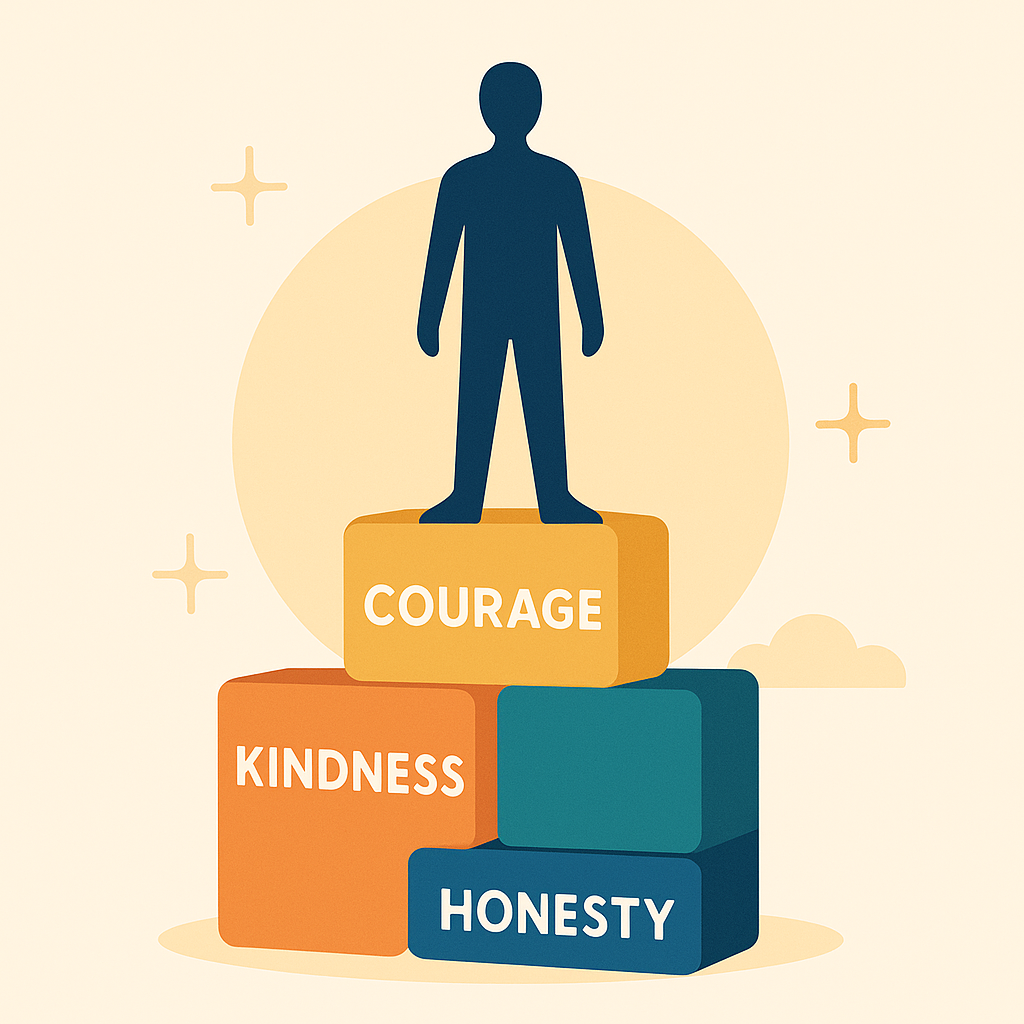
4. Virtues: Who You Become When Values Shape Your Actions
If values are what you care about, and principles are the rules that guide your choices, then virtues are the qualities you develop by living those choices consistently.
A virtue is not something you merely believe in. It is something you embody.
Value: Courage Principle: I face what scares me Virtue: I am a courageous person
Virtues live in the realm of identity.
They are like muscles:
- You build them through repetition
- They get stronger when tested
- If neglected, they weaken
Universal… yet deeply personal
Across cultures, we find remarkably similar virtues:
- Courage
- Justice
- Kindness
- Wisdom
- Temperance
- Generosity
- Humility
Humanity seems to intuitively know which traits lead to a thriving life. But how each person expresses them can look wildly different.
Courage for you might be:
- starting that company
- saying “I love you” first
- being honest in a difficult moment
- walking away from what hurts you
Same virtue, entirely different battlefield.
Virtues as the Bridge to Meaning
Living aligned with values feels good. But living out a virtue feels meaningful.
It gives you a sense that you are not just doing things… you are becoming someone.
This is why virtues show up in every hero story ever told. We don’t admire a character because they value bravery. We admire them because they act bravely even when they are afraid.
The Growth Question
Think of a virtue you admire in someone. Strength? Patience? Integrity?
Ask yourself:
What principle could I commit to that would build that virtue in me?
You don’t need a dramatic transformation. Virtues grow one choice at a time.
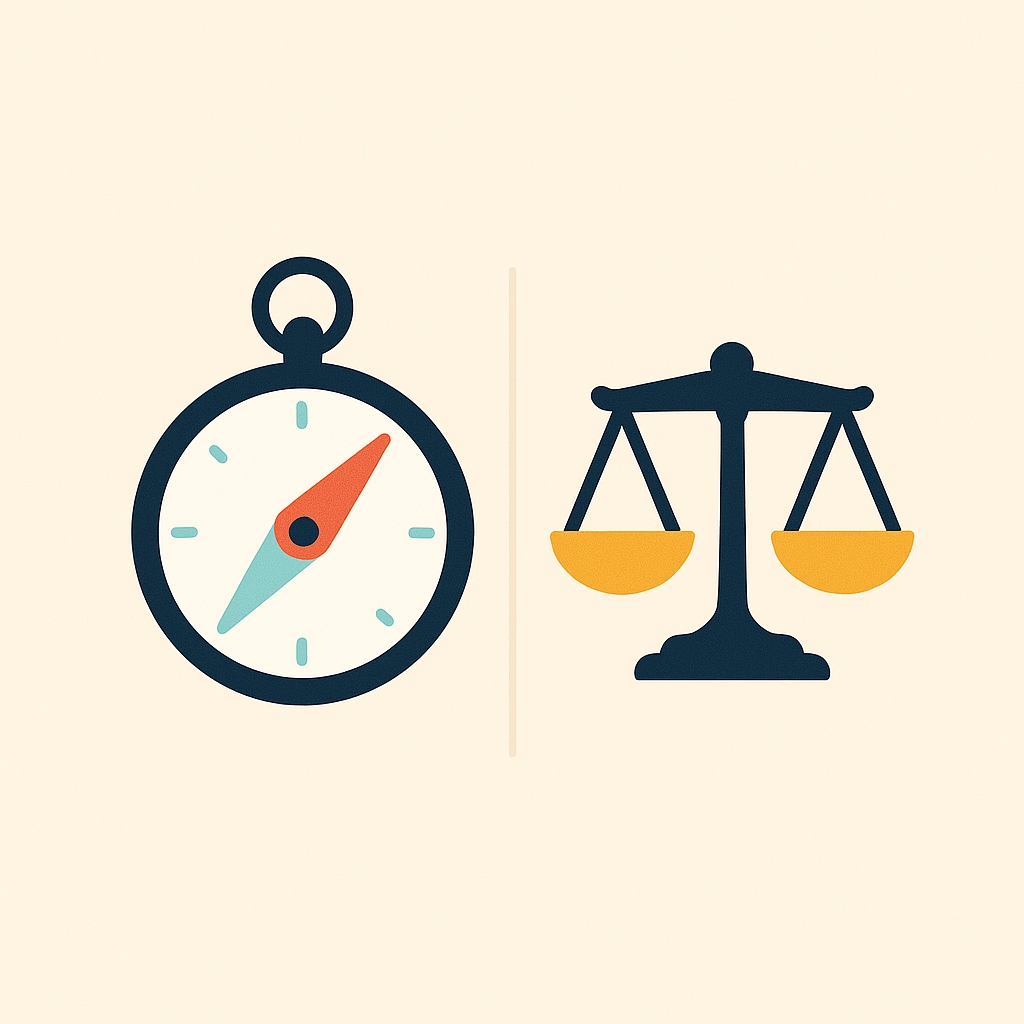
5. Morality & Ethics: Personal Compass vs. Collective Code
Morality and ethics often show up at the same parties wearing similar outfits, so people frequently mistake them for twins. But look closer and you’ll see they have distinct personalities, each playing a different role in how we decide what’s right and wrong.
Morality: Your Inner Judge
Morality is personal. It reflects the values and principles you use to evaluate your own and others’ behavior.
It answers questions like:
- Should I lie here?
- Is this fair?
- Am I being a good person?
Morality is shaped by:
- Family upbringing
- Cultural background
- Life experiences
- Personal reflections
Your morality can clash with someone else’s, even if you both believe you’re doing the right thing. Because morality is your compass, not the world’s.
Ethics: The Collective Agreement
Ethics, on the other hand, are social, not personal. Ethics are the rules communities create so we can live and work together without chaos.
Professions have ethical codes. Organizations have ethical standards. Societies have ethical frameworks embedded in law.
Ethics answer questions like:
- What does our team consider acceptable behavior?
- What should doctors do when a patient refuses treatment?
- What is a fair business practice?
Ethics protect the group, not just the individual.
Where They Clash
Sometimes morality tells you one thing, and ethics say another.
Example: A journalist learns a personal secret about a public figure.
Morality: “Don’t hurt them. Keep it private.”
Ethics of journalism: “Truth and transparency matter.”
This tension is the spark behind many of the most difficult human decisions.
Simple Distillation
| If morality is… | Then ethics is… |
|---|---|
| Your internal compass | The community’s rulebook |
| “I believe this is right” | “We have agreed this is right” |
| Personal | Shared |
| May vary wildly | Strives for consistency |
Morality tells you what you’ll stand for. Ethics tell you what we’ll stand for together.
Why It Matters
Understanding this difference helps explain:
- workplace conflicts
- cultural disagreements
- leadership challenges
- political debates
Most “value fights” are really morality vs. morality battles happening inside an ethical system that may not satisfy either side perfectly.
Recognizing these layers invites more empathy and better solutions. Because you can disagree on morality… while both following the same ethical structure.
6. How It All Works Together: A Dynamic Human System
We’ve been exploring each concept separately, like examining individual instruments in an orchestra. But to understand how we actually navigate life, we need to hear how they play together.
Here’s the elegant chain reaction that drives your decisions:
Beliefs → Values → Principles → Virtues → Morality → Ethics → (back to Beliefs)
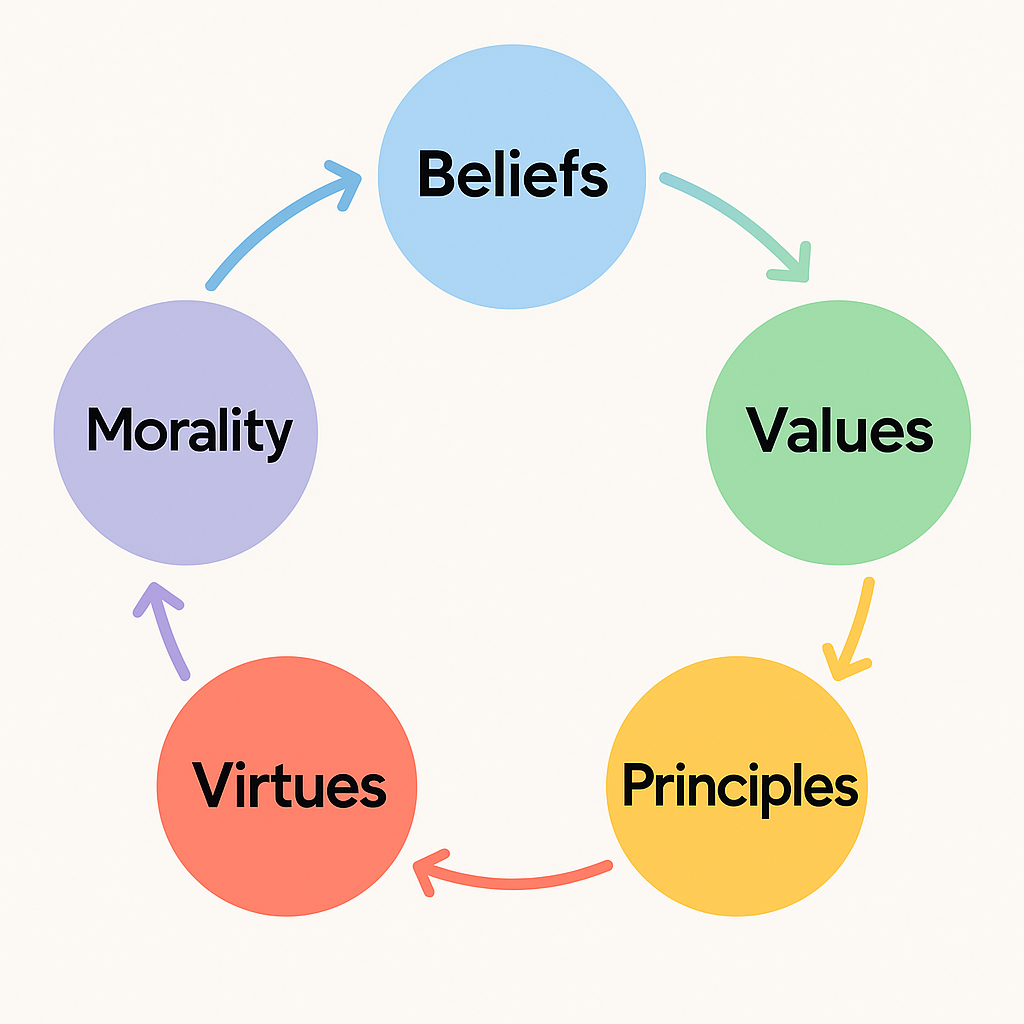
Each part influences the next, shaping not only what you do, but who you become.
A Living System, Not a Static One
This is not a ladder you climb once. It’s a feedback loop.
A new belief can shift your values. A new value can change a principle. Consistent principles shape virtues. Virtues strengthen your moral outlook. Shared morals contribute to evolving ethics. And ethical changes filter back into new beliefs.
Your identity is not carved in marble. It’s growing, learning, adapting.
An Example: The Courage Loop
Let’s follow one idea through the entire system.
Belief: “Fear doesn’t have to control me.”
→ Value: Courage
→ Principle: “I speak up when something matters.”
→ Virtue: You become someone who is courageous
→ Morality: You come to believe it’s wrong to remain silent when something is unjust
→ Ethics: You help shape group norms that encourage transparency
→ And back again: this reinforces your belief that courage changes lives
A single shift can change your whole story.
Why This System Matters
People often get stuck because they try to change behavior without changing what drives behavior.
They set a goal like: “I want to be healthier.” but never examine the belief underneath: “Taking care of myself isn’t selfish.”
When you understand this inner structure, transformation becomes intentional instead of accidental.
It’s the difference between: pulling weeds from the surface vs. removing them at the roots
Reflection
Which part of the system is calling for attention?
Do you need to…
- Examine old beliefs?
- Recommit to the values that matter most?
- Rewrite a principle you haven’t been living?
- Practice a virtue you admire?
- Clarify your moral standards?
- Understand the ethics of the environments you exist in?
Change can begin anywhere in the loop. But clarity about the loop makes change sustainable.

7. Why It Matters: From Understanding to Transformation
It’s one thing to know the difference between beliefs, values, principles, virtues, morality, and ethics. It’s something entirely different to use that knowledge to build a life that feels aligned, energized, and meaningful.
The way you navigate these concepts determines:
- whether your decisions feel confident or conflicted
- whether your success feels fulfilling or hollow
- whether you grow into your best self or drift from it
- whether you feel part of something bigger or out of place
When the System Is Aligned
Beliefs support values. Values guide principles. Principles build virtues. Virtues strengthen morality. Morality aligns with ethical environments.
That is when a person feels:
- grounded in who they are
- proud of the choices they make
- respected and trusted by others
- guided during difficult moments
- alive with a sense of purpose
It is a form of integrity that isn’t about perfection… but about consistency.
When the System Falls Out of Alignment
Misalignment creates internal friction:
Belief: “I deserve respect”
Value: “Kindness”
Principle: “I always put others first”
Emotion: Resentment
Virtue lost: Self-respect
Or:
Value: “Freedom”
Ethical setting: micromanaged corporate environment
Effect: burnout, disengagement, exit
Alignment isn’t a luxury. It’s mental well-being.
What You Can Do Right Now
A simple but powerful starting exercise:
- Name one belief that shapes your life
- Choose one core value that matters most today
- Write one principle that turns that value into action
- Commit to a small daily behavior that builds the virtue you want
Because change doesn’t begin with giant leaps. It begins with a single aligned step.
Example:
Belief: “Everyone has worth”
Value: Compassion
Principle: “I treat people with dignity, especially under stress”
Virtue built: Kindness
You don’t need to transform your entire life overnight. You simply need to upgrade its alignment.
A Question to Take With You
Who am I becoming as a result of the choices I make every day?
If the answer excites you, keep going. If not, today is a beautiful time to course-correct.
A Natural Next Step
If you want to explore your own values clearly and intentionally, take the Personal Values Assessment on personalvalu.es. It helps you:
- discover what truly matters to you
- prioritize your core values
- gain clarity on future decisions
- track how your values evolve over time
Your inner architecture is already there. This just gives you the blueprint.